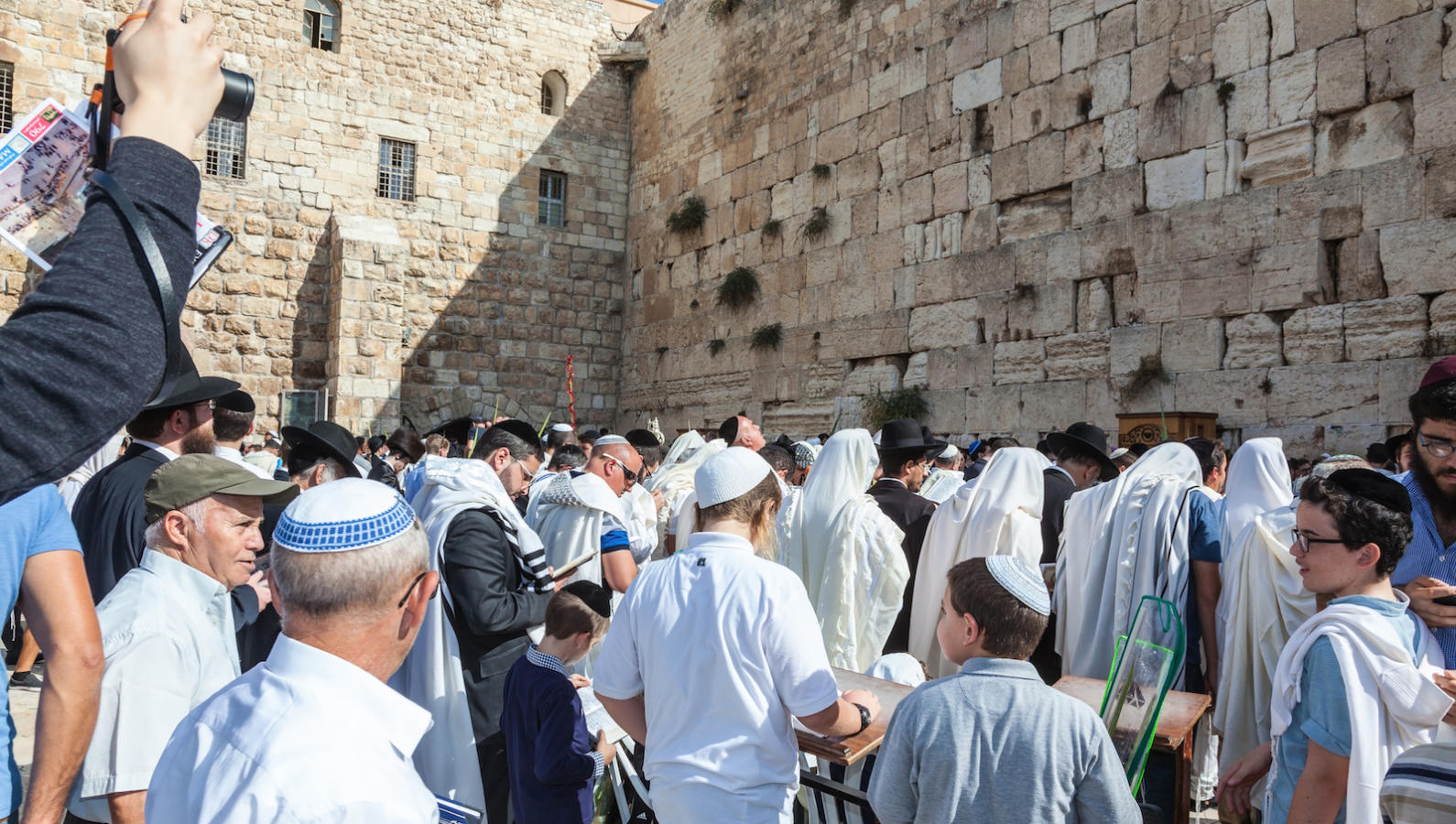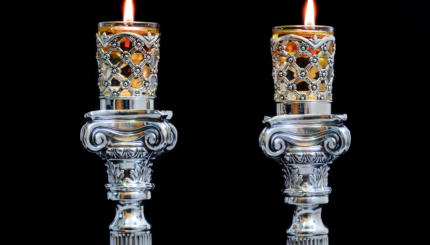In the Hoshana ritual, four verses, beginning with the words Hosha Na (“Save, we beseech Thee”), are each recited on responsively by the [prayer leader] and congregation.
The two say words that are derived from Psalms 118:25. Because of the manner of pronouncing the two words as one, the sages used the contracted form, Hoshana. However, it should be enunciated as two words. In the tradition the two words are contracted. But the hataf patah [a vowel sound] is placed on the last letter of the word Hosha, which causes the word to on be read as Hosha’ana.
Each of the four verses opens and closes with Hosha Na. In between are the phrases, “For Your sake, our God [Elohaynu],” “For Your sake, our Creator [Bore’aynu],” “For Your sake, our Redeemer [Go’alaynu],” and “For Your sake, O Thou Who searchest us [Doreshaynu].”
In the Sephardic tradition the word Hosha’ana is it uttered twice at the beginning and again at the end of the special Piyyut [liturgical poem] that follows. The special Piyyut is introduced with the four expressions, lema’anekha Elohaynu, lema’anekha Bore’aynu, lema’anekha Go’alaynu, and lema’anekha Doreshaynu, similar to the Ashkenazic version. The four expressions in the Ashkenazic and Sephardic rituals follow an alphabetical scheme but only up to the letter dalet. Though there are versions where the text continues with the alphabet up to the letter resh; only four expressions were used. It is possible that the use of the four letters only was to make it correspond to the same number of letters in God’s Name (YKVK). In both traditions a piyyut with a complete alphabetical acrostic follows.
With your help, My Jewish Learning can provide endless opportunities for learning, connection and discovery.
At the Hoshana service a scroll is taken from the , which remains open during the entire recitation of the prayers. The Torah is brought to the Bimah (Taybah) so that the Shaliach Tzibbur and worshipers carrying the Four Species make a circuit of the synagogue around the Torah. The reason for holding the Torah on the Bimah is because the Torah brings redemption upon us as upon an altar. The circuit is begun immediately when saying the piyyut and is made to the north, west, south, and east. It is customary to add the words Hosha Na before each letter of the alpha bet, for example, Hosha Na lema’an Amitakh, Hosha Na lema’an Beritakh. The Sheli’ah Tzibbur and congregation recite each stich responsively, first the Shaliach Tzibbur and then the worshipers. Some say Hosha Na before and after, as, for example, Hosha Na lema’an Amitakh Hosha Na. On the Sabbath a circuit is not made because in the Holy Temple, too, there was no procession. However, the ark is opened but a Torah scroll is not taken to the reading desk.
Making a circuit around the reading desk on Sukkot while each person holds the Four Species in his hands has its origin in the Temple service, as recorded in the Mishnah: “It was customary to make one procession around the altar on each day of Sukkot,and seven on the seventh day” [Sukkah 4:5]. The priests carried the palm branches or willows in their hands. The entire ceremony is to demonstrate rejoicing and gratitude for a blessed and fruitful year. Moreover, it serves to tear down the iron wall that separates us from our Father in Heaven, as the wall of Jericho was encompassed “and the wall fell down flat” (Joshua 6). Furthermore, the seven circuits correspond to the seven words in the verse Erhatz benikayon kapoy, va’asovevah et mizbahakha-Hashem–“I wash my hands in purity and circle around Your altar, O Lord” (Psalms 26:6).
In the Ashkenazic tradition the procession takes place at the completion of the Musaf [additional] service, immediately before the Shaliach Tzibbur’s recitation of Kaddish. This is in keeping with the procedure followed in the Temple, when the procession occurred after completing the Musaf offering. Israeli, Syrian, Turkish, Egyptian, and Sephardim follow the Ari, who prescribed that the procession take place in Shaharit [morning service] immediately after Hallel, so that the Lulav ritual receive an impressive finale. The rationale projected for reciting Hoshanot in Shaharit is that since one is holding the Lulav in hand at Hallel, why not make the circuit at the same time? Mitzvah ba’ah leyadkha al tahmitzenah (“a religious act in hand should not become sour by postponement”). London-Amsterdam Sephardim as well as Spanish-Portuguese Sephardim recite the Hoshanot after Musaf.
In the Sephardic tradition Hoshanot are introduced with the verse or verses, “I will wash my hands in innocence and circle around Your altar, O Lord” (Psalms 26:6); “to proclaim thanksgiving in a loud voice and to recount all Your wondrous deeds” (Psalms 26:7).18 “I wash my hands” hints at the Lulav that was picked by hand; “and circle around Your altar” alludes to the circuits made with the Lulav in the Temple; “to proclaim thanksgiving in a loud voice” hints at “Give thanks to the Lord for He is good” (Psalms 136:1); “and to recount all Your wondrous deeds” alludes to what we seek before Him in order to reach the moment of salvation.
The Yalkut interprets the first part of the verse–“I wash my hands in innocence”–to mean that the Lulav was acquired through purchase and not through theft, as written: ulekahtem lakhem, “You shall acquire for yourself (legitimately) on the first day of Sukkot”(Leviticus 23:30).
Excerpted from The Enclyclopedia of Jewish Prayer. Reprinted with the permission of the publisher. Copyright 1996 Jason Aronson, Inc.



